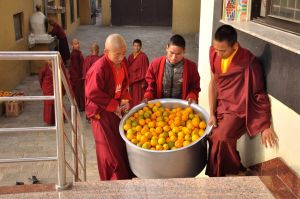Abhidanottara
Abhidanottara Tantra, the ones that detail the Four Chakrasamvara Mandalas. One is Armor Deities/Six Yoginis, then Seven Syllable mantra with Vajradaka, then the long Heruka mantra referring to Dakini Jala, and then Vairocana mantra.
It is centered on Varahi who in one instance arises from the letter Sri; it also has a version centered on Manjuvajra, which I did not know existed. The main difference with Samvarodaya Tantra is by using Vaiorcani within Armor Deities instead of Varahi; and again, this is
sequential, since Vairocana produces Varahi. That is the main difference. Abhidanottara or Laghuna Samvara was probably composed first, however, the Samvarodaya is very "linky" by explaining Varuni as the source of Vairocana.
This forces us to view the deities as tangible phases, more so than a piece of praise to memorize. Chakrasamvara texts are designed to be inoperable; . That is why Varuni + Armor Deities is about the highest thing I would recommend as an outer
Yoga devotee; the texts assert that this is what is used to become a Chakravartin, or i. e. master the Six Family Wheel as in
Dakini Jala, which is really the oldest or original Chakrasamvara text, even though not called such by name. The reverse is true, Chakrasamvara hails Dakini Jala.
That is why I would say when yoga symbols and concepts become inner realities, Dakini Jala and Varuni are the most useful guides.
One can also find the yogini Vadava, Mare, the name of Mare's Mouth Ocean Fire, and although I am unsure if this is supposed to translate the thing into the human body, it may.
Samvarodaya's male-first Armor Deities also hosts Samvari, whom one might think means something like a female Chakrasamvara, however, at the end of a list of Shakti Pithas, she is found as an equivalent of Vimala, probably in Bengal.
